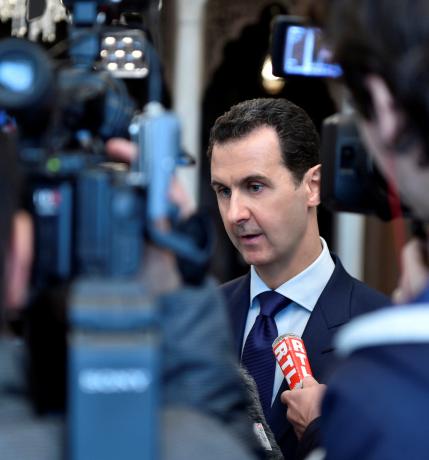
The Syrian government has denied rumors that President Bashar al-Assad is suffering from ill health, saying he was “carrying out his duties quite normally”.
Speculation swirled in recent days on social media and some Arab news websites saying Assad, 51, was in critical condition, citing rumors of stroke, or even that he had been shot.
“The presidency denies all these reports. President Assad is in excellent health,” his office said in a statement on Friday.
“They (the reports) coincide with the changing circumstances in the field and politically,” it said, without elaborating.
Rumors began to circulate on social media that Assad had suffered a significant health event over the weekend. According to the Turkish media outlet Sabah, the rumor took off when an Al Jazeera journalist, Faisal al-Qassim, said on Twitter that Assad was “bedridden” and used the news to demand Assad cease the Syrian government’s military activities. The UK Independent, meanwhile, traces the story back to Lebanese newspaper al-Mustaqbal, which reported that Assad had a stroke and is recovering in a Syrian hospital.
Earlier in the month the Saudi daily Asharq al-Awsat, based in London, claimed the Syrian leader’s mental health was deteriorating because of the ‘psychological pressures’ of Syria’s civil war.
The Ikhbariya news channel said on Monday that Assad had spoken by phone to Venezuelan President Nicolas Maduro, the first report from state media to detail Assad’s activities since the health rumors emerged.
Assad ally Russia and rebels backer Turkey hosted talks between the government and opposition in Kazakhstan last week, where they reaffirmed a shaky month-old ceasefire between the two sides ahead of a new round of planned peace negotiations in Geneva.
Assad had said before the Astana talks he was ready to discuss “everything”, including his own position within the framework of the Syrian constitution. His opponents have insisted throughout nearly six years of conflict that he must leave power under any peace deal.
But in the 17th year of his presidency Assad holds the upper hand in the Syrian war, bolstered by allies Russia and Iran whose military involvement has turned the conflict to his advantage.
The Syrian army and allied forces recaptured the Wadi Barada area near Damascus on Sunday, in another blow to rebels who have fought for years to unseat Assad.
Wadi Barada’s recapture came weeks after rebel groups were driven from areas they held for years in east Aleppo, their last major urban stronghold. Taking full control of Aleppo represented Assad’s most important gain yet in a conflict that grew out of protests against his rule in 2011.
Swathes of Syria remain outside his control, including the Islamic State-held eastern province of Deir al-Zor, large areas of the north held by Kurdish groups, and pockets of rebel-held territory in the west.
The Moscow-led effort to revive diplomacy has emerged as ties between Russia and Turkey have improved.
REUTERS/ ALJAZEERA

Leave a Reply
You must be logged in to post a comment.